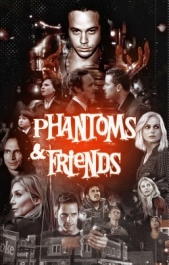Paper Towns

Paper Towns читать книгу онлайн
When Margo Roth Spiegelman beckons Quentin Jacobsen in the middle of the night — dressed like a ninja and plotting an ingenious campaign of revenge — he follows her. Margo's always planned extravagantly, and, until now, she's always planned solo. After a lifetime of loving Margo from afar, things are finally looking up for Q. . until day breaks and she has vanished. Always an enigma, Margo has now become a mystery. But there are clues. And they're for Q. Printz Medalist John Green returns with the trademark brilliant wit and heart-stopping emotional honesty that have inspired a new generation of readers.
Внимание! Книга может содержать контент только для совершеннолетних. Для несовершеннолетних чтение данного контента СТРОГО ЗАПРЕЩЕНО! Если в книге присутствует наличие пропаганды ЛГБТ и другого, запрещенного контента - просьба написать на почту [email protected] для удаления материала
But even so, I cannot picture her here alive. It occurs to me that the Whitman could be a suicide note. I think about things she highlighted: “To die is different from what any one supposed, and luckier.” “I bequeath myself to the dirt to grow from the grass I love, / If you want me again look for me under your bootsoles.” For a moment, I feel a flash of hope when I think about the last line of the poem: “I stop some where waiting for you.” But then I think that the Idoes not need to be a person. The Ican also be a body.
Radar has walked away from the raccoon and is tugging on the handle of one of the four locked steel doors. I feel like praying for the dead — saying Kaddish for this raccoon — but I don’t even know how. I’m so sorry for him, and so sorry for how happy I am to see him like this.
“It’s giving a little,” Radar shouts to us. “Come help.”
Ben and I both put our arms around Radar’s waist and pull back. He puts his foot up against the wall to give himself extra leverage as he pulls, and then all at once they collapse onto me, Radar’s sweat-soaked T-shirt pressed up against my face. For a moment, I’m excited, thinking we’re in. But then I see Radar holding the door handle. I scramble up and look at the door. Still locked.
“Piece of shit forty-year-old goddamned doorknob,” Radar says. I’ve never heard him talk like this before.
“It’s okay,” I say. “There’s a way. There has to be.”
We walk all the way around to the front of the building. No doors, no holes, no visible tunnels. But I need in. Ben and Radar try to peel the slabs of particleboard from the windows, but they’re all nailed shut. Radar kicks at the board, but it doesn’t give. Ben turns back to me. “There’s no glass behind one of these boards,” he says, and then he starts jogging away from the building, his sneakers splashing sand as he goes.
I give him a confused look. “I’m going to bust through the particleboard,” he explains.
“You can’t do that.” He is the smallest of our light trio. If anyone tries to smash through the boarded-up windows, it should be me.
He balls his hands into fists and then extends his fingers out. As I walk toward him, he starts talking to me. “When my mom was trying to keep me from getting beat up in third grade, she put me in tae kwon do. I only went to like three classes, and I only learned one thing, but the thing comes in handy sometimes: we watched this tae kwon do master punch through a thick wooden block, and we were all like, dude, how did he do that, and he told us that if you move as though your hand will go through the block, and if you believe that your hand will go through the block, then it will.”
I’m about to refute this idiotic logic when he takes off, running past me in a blur. His acceleration continues as he approaches the board, and then utterly without fear, he leaps up at the last possible second, twists his body sideways — his shoulder out to bear the brunt of the force — and slams into the wood. I half-expect him to burst through and leave a Ben-shaped cutout, like a cartoon. Instead, he bounces off the board and falls onto his ass in a patch of bright grass amid the sea of sandy dirt. Ben rolls onto his side, rubbing his shoulder. “It broke,” he announces.
I assume he means his shoulder as I race toward him, but then he stands up, and I’m looking at a Ben-high crack in the particle-board. I start kicking at it, and the crack spreads horizontally, and then Radar and I get our fingers inside the crack and start tugging. I squint to keep the sweat from burning my eyes, and pull with all my force back and forth until the crack starts to make a jagged opening. Radar and I urge it on with silent work, until eventually he has to take a break and Ben replaces him. Finally we are able to punch a big chunk of the board into the minimall. I climb in feetfirst, landing blindly onto what feels like a stack of papers.
The hole we’ve carved into this building gives a little light, but I can’t even make out the dimensions of the room, or whether there is a ceiling. The air in here is so stale and hot that inhaling and exhaling feel identical.
I turn around and my chin hits Ben’s forehead. I find myself whispering, even though there’s no reason to. “Do you have a—”
“No,” he whispers back before I can finish. “Radar, did you bring a flashlight?”
I hear Radar coming through the hole. “I have one on my key chain. It’s not much, though.”
The light comes on, and I still can’t see very well, but I can tell we’ve stepped into a big room filled with a labyrinth of metal shelves. The papers on the floor are pages from an old day-by-day calendar, the days scattered through the room, all of them yellowing and mouse-bit. I wonder if this might once have been a little bookstore, although it’s been decades since these shelves held anything but dust.
We fall into line behind Radar. I hear something creak above us, and we all stop moving. I try to swallow the panic. I can hear each of Radar’s and Ben’s breaths, their shuffling footsteps. I want out of here, but that could be Margo creaking for all I know. It could also be crack addicts.
“Just the building settling,” Radar whispers, but he seems less sure than usual. I stand there unable to move. After a moment, I hear Ben’s voice. “The last time I was this scared, I peed myself.”
“The last time I was this scared,” Radar says, “I actually had to face a Dark Lord in order to make the world safe for wizards.”
I made a feeble attempt. “The last time I was this scared I had to sleep in Mommy’s room.”
Ben chuckles. “Q, if I were you, I would get that scared Every. Single. Night.”
I’m not up for laughing, but their laughter makes the room feel safer, and so we begin to explore. We walk through each row of shelves, finding nothing but a few copies of Reader’s Digestfrom the 1970s lying on the floor. After a while, I find my eyes adjusting to the darkness, and in the gray light we start walking in different directions at different speeds.
“No one leaves the room until everyone leaves the room,” I whisper, and they whisper okay’sback. I get to a side wall of the room and find the first evidence that someone has been here since everyone left. A jagged semicircular, waist-high tunnel has been cut out of the wall. The words TROLL HOLE have been spray-painted in orange above the hole, with a helpful arrow pointing down to the hole. “Guys,” Radar says, so loud that the spell breaks for just a moment. I follow his voice and find him standing by the opposite wall, his flashlight illuminating another Troll Hole. The graffiti doesn’t look particularly like Margo’s, but it’s hard to tell for sure. I’ve only seen her spray-paint a single letter.
Radar shines the light through the hole as I duck down and lead the way through. This room is entirely empty except for a rolled carpet in one corner. As the flashlight scans the floor, I can see glue stains on the concrete from where the carpet had once been. Across the room, I can just make out another hole cut into the wall, this time without the graffiti.
I crawl through that Troll Hole into a room lined with clothing racks, the stainless-steel poles still bolted into walls wine-stained with water damage. This room is better lit, and it takes me a moment to realize it’s because there are several holes in the roof — tar paper hangs down, and I can see places where the roof sags against exposed steel girders.
“Souvenir store,” Ben whispers in front of me, and I know immediately he is right.
In the middle of the room five display cases form a pentagon. The glass that once kept the tourists from their tourist crap has mostly been shattered and lies in shards around the cases. The gray paint peels off the wall in odd and beautiful patterns, each cracked polygon of paint a snowflake of decay.
Strangely, though, there’s still some merchandise: there’s a Mickey Mouse phone I recognize from some way back part of childhood. Moth-bit but still-folded SUNNY ORLANDO T-shirts are on display, splattered with broken glass. Beneath the glass cases, Radar finds a box filled with maps and old tourist brochures advertising Gator World and Crystal Gardens and fun houses that no longer exist. Ben waves me over and silently points out the green glass alligator tchotchke lying alone in the case, almost buried in the dust. This is the value of our souvenirs, I think: you can’t give this shit away.























